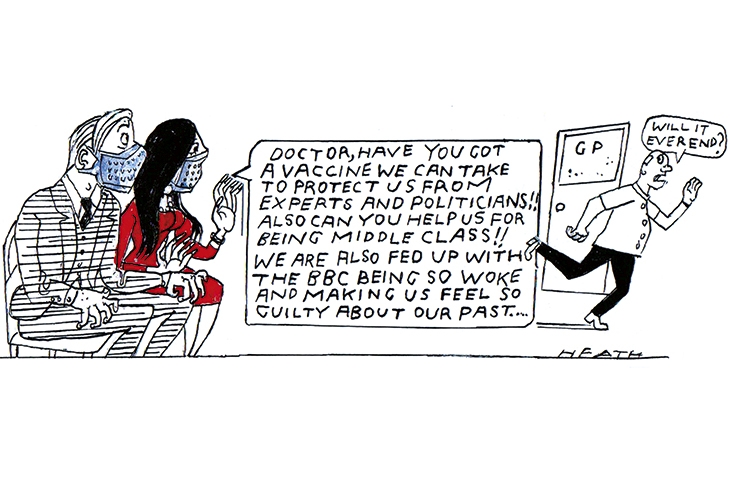Home
Supplies of the Pfizer vaccine (made in Belgium) were feared to be at risk from a declaration by the European Union health commissioner, Stella Kyriakides, that EU companies would have to ‘provide early notification whenever they want to export vaccines to third countries’. This came after AstraZeneca was said to be able to deliver by the end of March only 31 million of 80 million doses ordered by the EU. The company, with a factory in England, had undertaken to deliver two million doses a week to the UK. Nadhim Zahawi, the minister for vaccination, said that supplies were ‘tight’ but the mid-February target of 15 million vaccinations would be met. ‘We need to work together rather than use policies of vaccine nationalism,’ he said. By Sunday 24 January, 6.3 million first-dose vaccinations had been given, and 470,000 second doses. Professor Jonathan Van-Tam, the deputy chief medical officer for England, warned that scientists did ‘not yet know the impact of the vaccine on transmission’. The British Medical Association, the doctors’ union, criticised the government for delaying second doses from three weeks after the first dose to 12 weeks. A barber was hired illegally to cut the hair of 31 policemen at Bethnal Green station.
Boris Johnson, the Prime Minister, said there was evidence that Britain’s new variant of coronavirus was 30 per cent more deadly than the old. Sir Patrick Vallance, the government’s chief scientific adviser, said: ‘With the original variant, if you took a group of 1,000 infected men in their sixties, roughly ten would die. But with the new variant, roughly 13 or 14 of that group might be expected to die.’ Dozens of cases of a South African variant were found. Many travellers to England would in future have to quarantine in hotels. At the beginning of the week, Sunday 24 January, total deaths (within 28 days of testing positive for the coronavirus) had stood at 97,329, including 8,739 in the past week. Deaths soon passed 100,000, but new cases detected began to decline.
Some Conservative MPs demanded from the Prime Minister criteria for reopening schools. Male schoolteachers saw 39.2 deaths from Covid per 100,000, according to the Office for National Statistics — much lower than for restaurant managers (119 per 100,000); machine operatives, 106; taxi drivers and nursing assistants, 101; nurses, 79; and bus drivers, 70. Unemployment rose to 5 per cent. Boohoo bought the Debenhams brand and website for £55 million, but not its 118 shops or responsibility for its 12,000 employees. Asos was in talks about buying the Topshop brand. Jenners, the Edinburgh department store owned by House of Fraser, will close after 183 years.
Abroad
The total in the world who had died with coronavirus reached 2,128,825 by the beginning of the week, an increase of 97,925 from the week before. The United States had suffered the most deaths, more than 400,000. India, with more than 150,000 deaths, discovered many new cases. Australia imposed quarantine on travellers from New Zealand, where a case of the South African variant was found. Larry King, the American broadcaster, died of Covid aged 87.
More than 3,500 were detained during demonstrations in 100 cities and towns in Russia in favour of Alexei Navalny, the opposition leader arrested on his return to Russia on 17 January after recovering in Germany from being poisoned with Novichok in Tomsk in August. In Holland more than 350 were detained during protests and nights of riots against coronavirus restrictions; shops in Rotterdam were looted. France prepared for a third confinement. Tse Chi Lop, a Chinese-born Canadian said to head the Company drug cartel in Asia, was arrested at Schiphol airport on an Australian warrant. The Japanese carmaker Nissan said production at its Sunderland plant was secure for the long term.
President Joe Biden lifted Donald Trump’s ban on transgender Americans joining the military; 8,980 were said to be serving in 2019. Mr Biden spoke to Boris Johnson for 35 minutes on the telephone. The Senate will begin a trial of Mr Trump on 8 February. The Islamic State said it was behind two bombers blowing themselves up and killing at least 32 people at the Tayaran Square market in Baghdad, where 35 died in a similar attack in January 2018. In China 11 gold-miners were rescued after two weeks trapped deep underground; ten others died. CSH






Comments